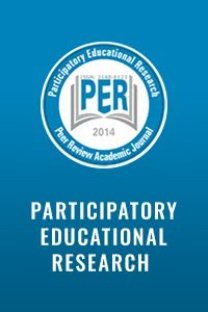Conceptions and Misconceptions of Instructors Pertaining to Their Roles and Competencies in Distance Education: A Qualitative Case Study
The purpose of this study is to investigate the conceptions and misconceptions of instructors pertaining to their roles and competencies in distance education. Case study research design was adopted within the study. The participants, nine instructors in a public university delivering the courses in fully distance programs, was selected by using typical case sampling strategy. The data were collected through semi-structured interviews and observations on distance courses. The collected data were analysed through constant comparison analysis. The qualitative analysis revealed instructors’ conceptions of roles, competencies, and misconceptions in distance education. Roles included planning and delivery. Planning sub-theme covered the roles of environmental / technical planning and instructional design. Delivery sub-theme covered the roles of lecturing, evaluation, guidance, motivation, and material development. Participants’ conceptions of competencies included ICT competency, communication skills, and subject expertise. Finally, the study findings identified the misconceptions of the instructors. The identified misconceptions were identified as use of the same materials with face-to-face education, sufficient materials, lack of role for interaction among students, ineffectiveness of distance education, having the same roles with face-to-face education, and impossibility of distance collaboration among students. The findings imply that the instructors’ conceptions of roles and competencies are based on their experience in both face-to-face and distance education and this base unsurprisingly caused misconceptions regarding teaching in distance education.
___
- Aydın, C. H. (2005). Turkish mentors’ perception of roles, competencies and resources for online teaching. Turkish Online Journal of Distance Education, 6(3), 58-80.
- Baran, E., Correia, A. P., & Thompson, A. (2011). Transforming online teaching practice: Critical analysis of the literature on the roles and competencies of online teachers. Distance Education, 32(3), 421-439.
- Bawane, J., & Spector, J. M. (2009). Prioritization of online instructor roles: implications for competency-based teacher education programs. Distance Education, 30(3), 383-397.
- Belcheir, M.J. & Cucek, M. (2002). Faculty perceptions of teaching distance education courses. Research Report. Boise State Üniversitesi. Retrieved from: https://files.eric.ed.gov/fulltext/ED480925.pdf
- Berge, Z. L. (2008). Changing instructor’s roles in virtual worlds. Quarterly Review of Distance Education, 9(4), 407-414.
- Creswell, J. W. (2007). Qualitative Inquiry and Research Design: Choosing among Five Approaches (2nd Ed.). Sage.
- Darabi, A. A., Sikorski, E. G., & Harvey, R. B. (2006). Validated competencies for distance teaching. Distance Education, 27(1), 105-122.
- DEAC, Distance Education Accrediting Commission. (2017). Directory of accredited institutions. Retrieved from https://www.deac.org/Student-Center/Directory-Of-Accredited-Institutions.aspx
- Easton, S. S. (2003). Clarifying the instructor's role in online distance learning. Communication Education, 52(2), 87-105.
- Fang, B. (2007). A performance-based development model for online faculty. Performance Improvement, 46(5), 17-24.
- Garrison, D. R., Cleveland-Innes, M., Koole, M., & Kappelman, J. (2006). Revisiting methodological issues in transcript analysis: Negotiated coding and reliability. The Internet and Higher Education, 9(1), 1-8.
- González-Sanmamed, M., Muñoz-Carril, P. C., & Sangrà, A. (2014). Level of proficiency and professional development needs in peripheral online teaching roles. The International Review of Research in Open and Distributed Learning, 15(6), 162-187.
- Goodyear, P., Salmon, G., Spector, J. M., Steeples, C., & Tickner, S. (2001). Competences for online teaching: A special report. Educational Technology Research and Development, 49(1), 65-72.
- Gök B. (2007) Uzaktan eğitimde görev alan öğretim elemanlarının uzaktan eğitim algısı. Unpublished master’s thesis, Gazi University, Ankara.
- Guasch, T., Alvarez, I., & Espasa, A. (2010). University teacher competencies in a virtual teaching/learning environment: Analysis of a teacher training experience. Teaching and Teacher Education, 26(2), 199-206.
- Gülbahar, Y. (2009). E-ögrenme. Ankara: Pegem Yayıncılık.
- Heuer, B. P., & King, K. P. (2004). Leading the Band: The role of the instructor in online learning for Educators. The Journal of Interactive Online Learning, 3(1), 1-11.
- Kara M. (2018). Influential factors on faculty performance in distance education. Unpublished Doctoral Dissertation, Middle East Technical University, Ankara. Kaya, Z. (2002). Uzaktan Eğitim. Pegem Yayıncılık.
- Koloğlu T. F. (2016) Öğretim elemanlarının uzaktan eğitime bakış açıları ve hazırbulunuşlukları: Ordu üniversitesi örneği. Unpublished Master’s Thesis, Afyon Kocatepe University, Afyonkarahisar.
- Lincoln, Y. S. & Guba, E. G. (1985). Naturalistic inquiry. Sage.
- İncik, E. Y., & Tanrıseven, I. (2012). Eğitim fakültesi öğretim elemanlarının ve öğretmen adaylarının öğrenci merkezli eğitime ilişkin görüşleri (Mersin üniversitesi örneği). Mersin Üniversitesi Eğitim Fakültesi Dergisi, 8(3), 172–184.
- Miles, M. B. & Huberman, A. M. (1994). Qualitative Data Analysis: An Expanded Source Book (2nd Ed.). Sage.
- Moore, M. G. & Kearsley, G. (2004). Distance Education: A Systems View (2nd Ed.). USA: Wadsworth Publishing . Özcan, H. & Yıldırım, S. (2018). Administrators’ perceptions of motives to offer online academic degree programs in universities. International Review of Research in Open and Distributed Learning, 19 (1), 327-341.
- Simonson, M., Smaldino, S., & Zvacek, S. (2015). Teaching and learning at a distance: Foundations of distance education (6th ed.) Charlotte, NC: Information Age. Turkish Education Association (2009). Öğretmen yeterlikleri özet rapor: Öğretmene yatırım, geleceğe atılım. Retrieved from ted.org.tr . Umurhan, H. (2014). Öğretim elemanlarını uzaktan eğitime teşvik eden unsurlar: Gazi üniversitesi örneği. Unpublished Master’s Thesis. Gazi University, Ankara.
- Varvel, V. E. (2007). Master online teacher competencies. Online journal of distance learning administration, 10(1), 1-41.
- Williams, P. E. (2003). Roles and competencies for distance education programs in higher education institutions. The American Journal of Distance Education, 17(1), 45-57.
- ISSN: 2148-6123
- Yayın Aralığı: Yılda 6 Sayı
- Başlangıç: 2014
- Yayıncı: Özgen KORKMAZ
